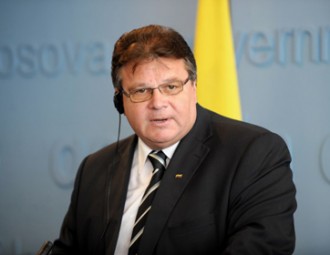Lithuania’s Foreign Minister urged Belarus to discuss visa facilitation and readmission agreements

Linas Linkevičius called on Belarus not to stop after the release of political prisoners with regard to human rights, rule of law, and democracy and voiced his concern over the Astravets NPP project.
On 12 November in Minsk, the Minister of Foreign Affairs of Lithuania Linas Linkevičius met with the Minister of Foreign Affairs of Belarus Uladzimir Makei. The Foreign Ministers discussed opportunities for further cooperation between the European Union and Belarus, which would open up thanks to the EU decision to suspend sanctions against Belarus for 4 months.
Linkevičius drew attention to the fact that the EU would once again consider the suspension of most restrictive measures after the issuance of a report on the presidential elections in Belarus by the OSCE Office for Democratic Institutions and Human Rights (ODIHR) in February 2016, press service of the Lithuanian Foreign Ministry informs.
Lithuania’s Foreign Minister called on Belarus not to stop after the release of all political prisoners and to take further positive steps with regard to human rights, the rule of law and democracy. Linkevičius also urged Belarus to make progress in the negotiations on visa facilitation and readmission agreements with the European Union.
In the meeting, Linkevičius voiced his concern over the Belarusian nuclear power plant project and underlined the necessity of ensuring the adherence to the international nuclear safety requirements, including the requirements for environmental protection. Lithuania’s Foreign Minister noted that when constructing a nuclear power plant next to the neighbouring country’s capital city, one had to ensure maximum transparency and openness, and assure that this would not entail risks for the Lithuanian population and the environment.
Linkevičius urged Belarus to implement as soon as possible the conclusions adopted at the Meeting of the Parties to the Espoo Convention in 2014. Belarus was encouraged to fulfill the requirements of the Espoo Convention and take into consideration key issues raised by Lithuania. The Foreign Ministers agreed to continue discussing the implementation of the requirements of the Espoo Convention during a bilateral expert meeting to be held in December 2015 in Vilnius.
The heads of diplomacy of the two countries looked for solutions to the problems of Lithuanian carriers operating in Belarus. Linkevičius also urged Belarus to conclude all the procedures, which were necessary for facilitated travel in border areas extending no further than 50 km from the border line.
-
03.01
-
07.10
-
22.09
-
17.08
-
12.08
-
30.09



























